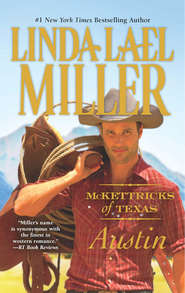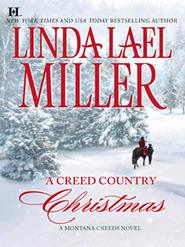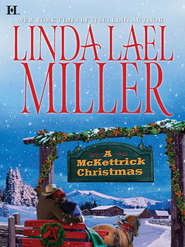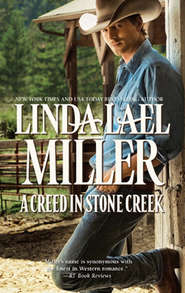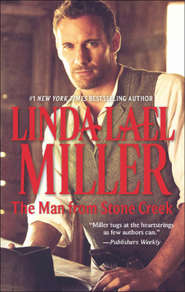По всем вопросам обращайтесь на: info@litportal.ru
(©) 2003-2024.
✖
The Christmas Brides: A McKettrick Christmas
Автор
Год написания книги
2019
Настройки чтения
Размер шрифта
Высота строк
Поля
Resolutely, Lizzie buttoned up the conductor’s coat, extracted a scarf from her hand luggage and tied it tightly under her chin, in order to protect her ears from a cold she knew would be merciless.
Once ready, she crept to the back of the car, struggled with the door, winced when it made a slight creaking sound. A quick glance back over one shoulder reassured her. None of the other passengers stirred.
The cold, as she had expected, bit into her flesh like millions of tiny teeth, but the snow had stopped coming down, and she could see clearly in the light of the moon. The car was still linked to the one behind it, and both remained upright.
Shivering on the tiny metal platform between the two cars, Lizzie risked a glance toward the cliff and was alarmed to see how close the one she’d just left had come to pitching over the edge.
Her heart pounded; for a moment she considered rushing back to awaken the others, herd them into the baggage car, which was, at least, still sitting on the tracks.
But would the second car be any safer?
It was too cold to stand there deliberating. She shoved open the next door. They would all be better able to deal with the crisis if she found food, blankets, anything to keep body and soul together until help arrived. And help would arrive. Her father and uncles were probably on their way even then. The question was, would they get there before there was another snowslide, before everyone perished from the unrelenting cold?
Lizzie found her own three steamer trunks, each of them nearly large enough for her to stand up inside, stacked one on top of the other. A pang struck her. Papa had teased her mercilessly about traveling with so much luggage. You’d never make it on a cattle drive, he’d said.
God, how she missed Holt McKettrick in that moment. His strength, his common sense, his innate ability to deal ably with whatever adversity dared present itself.
Think, Lizzie, she told herself. Fretting is useless.
Chewing on her lower lip, she pondered. Of course the coat and her other woolen garments were in the red trunk, and it was on the bottom. If she dislodged the other two—which would be a Herculean feat in its own right, involving much climbing and a lot of pushing— would the inevitable jolts send the passenger car, so precariously tilted, plummeting to the bottom of the ravine?
She decided to proceed to the freight car and think about the trunks on the way back. It was very possible, after all, that orders of blankets and coats and stockings and—please, God, food—might be found there, originally destined for the mercantile in Indian Rock, thus alleviating the need to rummage through her trunks.
Getting into the freight car proved impossible—the door was frozen shut, and no amount of kicking, pounding and latch wrenching availed. She finally lowered herself to the ground, by means of another small ladder, and the snow came up under her skirts to soak through her woolen bloomers and sting her thighs. She was perilously close to the edge, too—one slip and she would slide helplessly down the steep bank.
At least the hard work of moving at all warmed her a bit. Clinging to the side of the car with both hands, she made her precarious way along it. Her feet gave way once, and only her numb grip on the iron edging at the base of the car kept her from tumbling to her death.
After what seemed like hours, she reached the rear of the freight car. Somewhere in the thinning darkness, a wolf howled, the sound echoing inside Lizzie, ancient and forlorn.
Buck up, she ordered herself. Keep going.
Behind the freight car was the caboose, painted a cheery red. And, glory be, a chimney jutted from its roof. Where there was a chimney, there was a stove, and where there was a stove— Blessed warmth.
Forgoing the freight car for the time being, Lizzie decided to explore the caboose instead.
She had to wade through more snow, and nearly lost her footing again, but when she got to the door, it opened easily. She slipped inside, breathless, teeth chattering. Somewhere along the way, she’d lost her scarf, so her ears throbbed with cold, fit to fall right off her head. There was a stove, a squat, pot-bellied one, hardly larger than the kettle Lorelei used for rendering lard at home. And on top of that stove, miraculously still in place after the jarring impact of the avalanche, stood a coffee pot. Peering inside a small cupboard near the stove, she saw a few precious provisions—a tin of coffee, a bag of sugar, a wedge of yellow cheese.
Lizzie gave a ranch-girl whoop, then slapped a hand over her mouth. Raised in the high country from the time she was twelve, she knew that when the snow was so deep, any sudden sound could bring most of the mountainside thundering down on top of them. She listened, too scared to breathe, for an ominous rumble overhead, but none came.
She assessed the long, benchlike seats lining the sides of the car. Room for everyone to lie down and sleep.
Yes, the caboose would do nicely.
She forced herself to go outside again—even the sight of that stove, cold as it was, had warmed her a little. The freight car proved as impenetrable from the rear door as from the first one Lizzie had tried, but she was much heartened, just the same. Morgan, Whitley and the peddler would be able to get inside.
She was making her way back along the side of the train, every step carefully considered, both hands grasping the side, when it happened.
Her feet slipped, her stomach gave a dull lurch, and she felt herself falling.
She slid a few feet, managed to catch hold of a tree root, the tree itself long gone. Fear sent the air whooshing from her lungs, as if she’d been struck in the solar plexus, and she knew her grip would not last long. She had almost no feeling in her hands, and her feet dangled in midair. She did not dare turn her head and look down.
“Help me!” she called out, in a voice that sounded laughably cheerful, given the circumstances.
Morgan’s head appeared above her, a genie sprung from a lamp. “Hold on,” he told her grimly, “and do not move.”
She watched, blinking salty moisture from her eyes, as he unbuckled his belt, pulled it free of his trousers and fashioned a loop at one end. He lay down on his belly and tossed the looped end of the belt within reach.
“Listen to me, Lizzie,” he said very quietly. “Take a few breaths before you reach for the belt. You can’t afford to miss.”
Lizzie didn’t even nod, so tenuous was her hold on the root. She took the advised breaths, even closed her eyes for a moment, imagined herself standing on firm ground. Safe with Morgan.
If she could just get to Morgan….
“Ready?” he asked.
“Yes,” she said. Still clinging to the root, which was already giving way, with one hand, she grasped the leather loop with the other. Morgan’s strength seemed to surge along the length of it.
“I’ve got you, Lizzie,” Morgan said. “Take hold with the other hand.”
After another deep breath, she let go of the root.
Morgan pulled her up slowly, and very carefully. When she crested the bank, he hauled her into his arms and held her hard, both of them kneeling only inches from the lip of the cliff.
“Easy, now,” he murmured, his breath warming her right ear. “No sudden moves.”
Lizzie nodded slightly, her face buried in his shoulder, clinging to the fabric of his coat with both hands.
Morgan rose carefully to his feet, bringing Lizzie with him.
“The caboose,” she said, trembling all over. “There’s a stove in the caboose—and a c-coffeepot.”
He took her there. Seated her none too gently on one of the long seats. “What the hell were you thinking?” he demanded, moving to the stove, stuffing in kindling and old newspaper from the half-filled wood box, striking a match to start a blaze.
“I was looking for food…blankets—”
Morgan gave her a scathing look. Took the coffeepot off the stove and went out the rear door of the caboose. When he came back, Lizzie saw that he’d filled the pot with snow. He set it on the stove with an eloquent clunk. “You could have been killed!” he rasped, pale with fury.
“How did you know to…to come looking for me?”
“John Brennan woke me up. Said he’d seen you leave the car. At first, he thought he was dreaming, because nobody would do anything that stupid.”
“You left the car,” Lizzie reminded him. “What’s the difference?”
“The difference, Lizzie McKettrick, is that you are a woman and I am a man. And don’t you dare get up on a soapbox. If I hadn’t come along when I did, you’d be at the bottom of that ravine by now. And it was the grace of—whoever—that we didn’t both go over!”
He found a tin of coffee among the provisions, spooned some into the pot, right on top of the snow.
Lizzie realized that he’d put himself in no little danger to pull her to safety. “Thank you,” she said, with a peculiar mixture of graciousness and chagrin.






